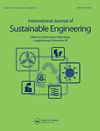Effects of waste plastics as partial fine-aggregate replacement for reinforced low-carbon concrete pavements
IF 3.6
Q3 GREEN & SUSTAINABLE SCIENCE & TECHNOLOGY
International Journal of Sustainable Engineering
Pub Date : 2022-08-23
DOI:10.1080/19397038.2022.2108156
引用次数: 2
Abstract
ABSTRACT Using waste plastics as a partial natural aggregate replacement and monitoring strength and workability reduction in pavement structures is vital to net-carbon zero. This study explores the utilisation of waste plastic as a fine aggregate replacement in medium-strength reinforced concrete pavements, for improving plastic aggregate performance and the intrinsic reasoning for observed strength performance. Various weight fractions of fines were substituted by the same weight of plastic aggregates ranging from 5–15% according to the appropriate standards (Eurocodes and British Standards). The physical and mechanical properties of the composites were analysed. The results indicated that the use of polymeric materials as a partial replacement for fines contributed to a decrease in workability, compressive strength and push-out bond between steel reinforcement and concrete. Despite these trends, 5% replacement of fine aggregates with plastic waste surpassed all the feasibility criteria. Furthermore, using 10% of plastic replacement by weight was deemed feasible in non-structural applications such as roads, pavements, and facades. The outputs have demonstrated environmental engineering concepts in tackling plastic waste, providing an alternative to conventional aggregate. Environmental benefits can arise due to the removal of potentially hazardous plastics from entering ecosystems as well as minimising dredging of global sand reserves.废塑料部分替代细骨料对低碳钢筋混凝土路面的影响
使用废塑料作为部分天然骨料替代和监测强度和工作性降低的路面结构是至关重要的净碳零。本研究探讨了在中等强度钢筋混凝土路面中使用废塑料作为细骨料的替代品,以改善塑料骨料的性能和观察到的强度性能的内在原因。根据适当的标准(欧洲法规和英国标准),用相同重量的塑料骨料代替不同重量的细粒,重量范围为5-15%。对复合材料的物理力学性能进行了分析。结果表明,使用聚合物材料作为部分替代细粒有助于降低和易性,抗压强度和钢筋与混凝土之间的推出粘结。尽管有这些趋势,5%的塑料废物替代细骨料超过了所有的可行性标准。此外,在道路、人行道和外墙等非结构应用中,使用10%的塑料替代重量被认为是可行的。这些成果展示了处理塑料废物的环境工程概念,为传统骨料提供了一种替代方案。由于清除了进入生态系统的潜在有害塑料,以及最大限度地减少了全球沙子储备的疏浚,可以产生环境效益。
本文章由计算机程序翻译,如有差异,请以英文原文为准。
求助全文
约1分钟内获得全文
求助全文
来源期刊

International Journal of Sustainable Engineering
GREEN & SUSTAINABLE SCIENCE & TECHNOLOGY-
CiteScore
7.70
自引率
0.00%
发文量
19
 求助内容:
求助内容: 应助结果提醒方式:
应助结果提醒方式:


